Your Complete Guide to Choosing a Dog Trainer in Silver Spring
Living with a dog in Silver Spring means navigating busy sidewalks around Downtown, enjoying community events at Veterans Plaza, and making the most of nearby parks. Your dog needs training that prepares them for this active environment, whether you’re walking the crowded streets near the Metro station or relaxing at outdoor cafes on Ellsworth Drive.
Montgomery County sets the local rules that affect your daily routine with your dog. Understanding these regulations helps you choose training programs that work in real-world situations, not just in a controlled classroom setting.
How to Choose the Right Trainer
Start by looking for a trainer who focuses on positive reinforcement rather than intimidation or punishment. This approach builds a strong relationship between you and your dog while creating lasting results that transfer to challenging environments like the busy Silver Spring Farmers Market or crowded park events.
Professional credentials matter when evaluating trainers. Look for established certifications like KPA-CTP, CPDT-KA, CTC, or IAABC-CDBC. If your dog struggles with serious behavioral issues like aggression or severe anxiety, additional credentials such as CBCC-KA show specialized expertise in behavior modification.
The best trainers understand that Silver Spring dogs need to handle real distractions. Ask potential trainers how they’ll gradually introduce your dog to challenging situations, from quiet neighborhood walks to the hustle and bustle near the transit center, and what ongoing support they provide as you practice between sessions.
Understanding Different Training Approaches
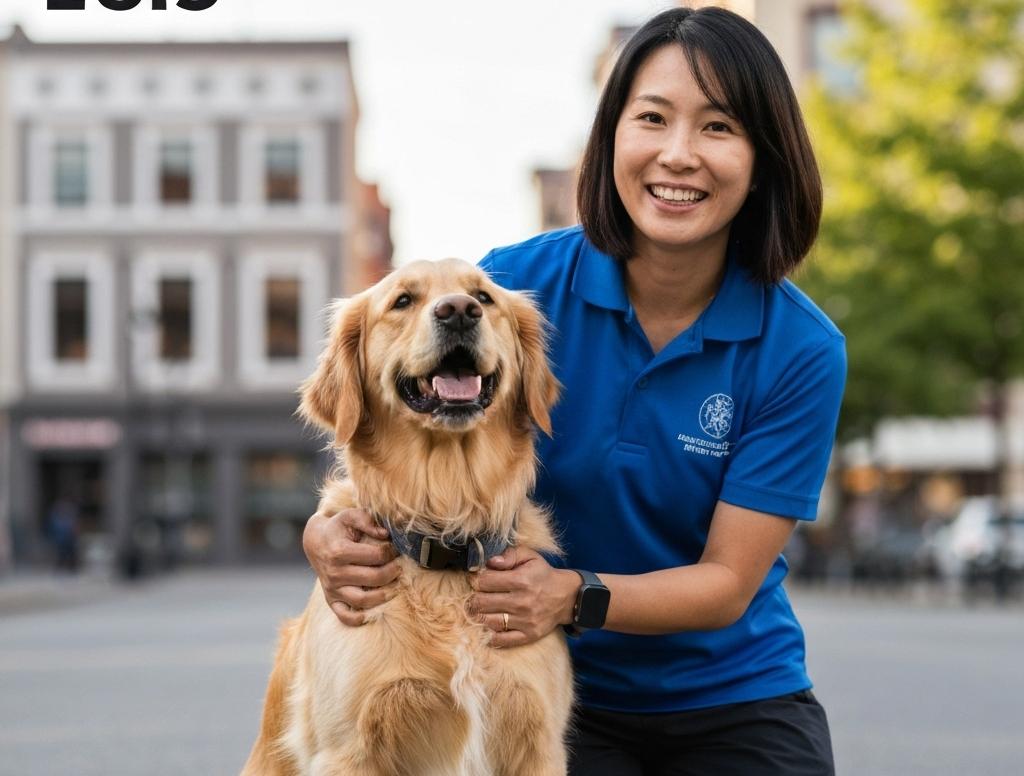
Positive reinforcement forms the foundation of effective modern dog training. This method uses rewards like treats, praise, and play to encourage the behaviors you want to see more often. Dogs learn faster and retain lessons longer when they feel safe and engaged, which is especially important for puppies and rescued dogs adjusting to new homes.
Leash training becomes particularly important in Silver Spring’s urban environment. Good trainers combine reward-based techniques with careful exposure to local distractions. Since sidewalks here can be narrow and crowded, teaching your dog a reliable “let’s go” cue and a calm sit at intersections makes daily walks much more enjoyable for both of you.
When dogs show fear, reactivity, or aggression, skilled trainers use behavior modification techniques like desensitization and counter-conditioning. This approach is crucial for dogs who struggle with triggers they’ll regularly encounter, such as other dogs on the Sligo Creek Trail or crowds gathered around street festivals and community events.
Training Costs in the Silver Spring Area
Training prices in Silver Spring reflect the broader DC metropolitan market, with rates generally higher than in rural areas. Specialized services like in-home training and behavior modification typically cost more than basic group classes.
| Service Type | Average Cost Range |
|---|---|
| Group classes (4–6 weeks) | $200 – $350 |
| Private lessons (60–90 minutes) | $140 – $225 per session |
| Puppy programs | $225 – $450 for group classes, $500 – $900 for private packages |
| Day training (per week) | $700 – $1,200 |
| Board and train programs (2–4 weeks) | $2,800 – $5,500 |
| Behavior consultation | $175 – $300 |
Several factors influence pricing, including the trainer’s experience level, professional certifications, travel time for in-home visits, and the complexity of your dog’s needs. Always ask for a detailed breakdown of what’s included in any training package and whether there are additional fees for materials or follow-up support.
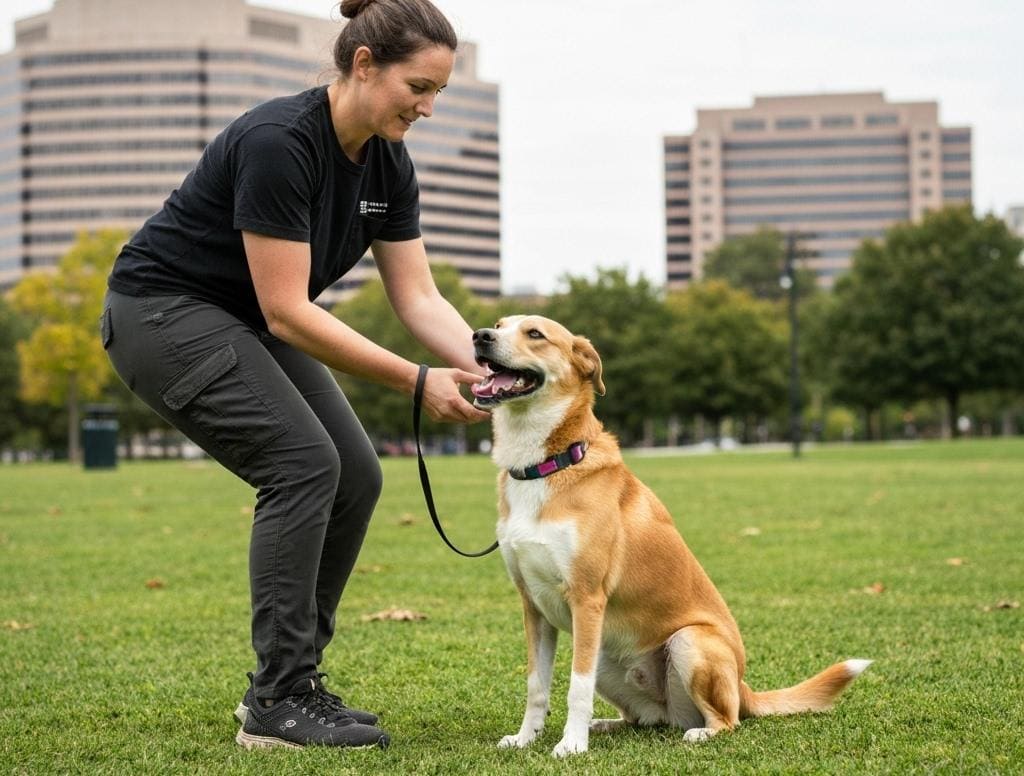
Questions to Ask Potential Trainers
- What training methods do you use, and how do you ensure sessions remain positive and stress-free for my dog?
- What certifications do you hold, and how do you stay updated on current training techniques?
- Can you describe what a customized training plan would look like for my specific goals and schedule?
- Do you offer group classes, private lessons, or day training options, and which would work best for my dog’s temperament and needs?
- How will we track my dog’s progress, and how much daily practice do you expect between sessions?
- What are your total costs, including any travel fees, and what’s your policy on missed appointments?
- Do you carry professional liability insurance, and can you provide proof if requested?
- For behavioral issues, do you work with veterinarians when medical factors might be involved?
- Once my dog masters basic skills, can we practice in more challenging environments like Downtown Silver Spring?
Local Resources for Silver Spring Dog Owners
Silver Spring falls under Montgomery County’s jurisdiction, which means county regulations govern most aspects of dog ownership, from licensing requirements to park usage rules.
Montgomery Parks maintains several dog-friendly locations throughout the area:
- The system’s dog parks and off-leash areas are listed with current rules and hours at Dog Parks | Montgomery Parks
- Ellsworth Urban Dog Park, located in Downtown Silver Spring, provides a fenced area perfect for off-leash training and socialization practice (details at Ellsworth Urban Park)
- Just south of Silver Spring, Takoma Park Dog Park offers another enclosed space for safe off-leash work (information available at Takoma Park Dog Park)
For leashed training walks, the paved paths along Sligo Creek provide excellent practice opportunities with manageable distractions. You can find park information and trail maps at Sligo Creek Stream Valley Park.
When you’re ready for longer outings, the Montgomery County section of Rock Creek offers more extensive trail systems (access information at Rock Creek Stream Valley Park).
Montgomery County requires dog licensing and outlines owner responsibilities at Pet Licensing. If your trainer plans to conduct group classes in public parks, they may need permits and insurance documentation (guidance available at Park Permits | Montgomery Parks).
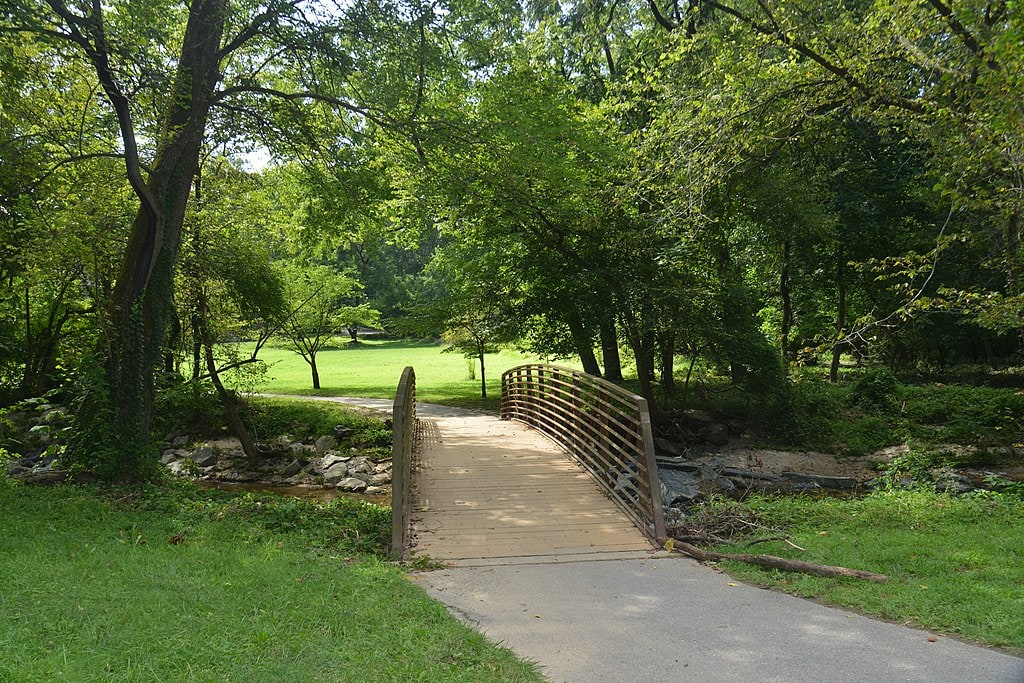
Understanding Local Laws and Regulations
Montgomery County’s leash law requires dogs to remain leashed when off their owner’s property, except in designated dog parks. This means recall training should happen within fenced dog park areas, while leash manners and obedience work can be practiced throughout parks and neighborhoods.
All dogs four months and older must be licensed through the county. Dogs also need current rabies vaccinations as required by Maryland state law (information available at Maryland Rabies Information).
Apartment and townhome living in Silver Spring means being considerate of neighbors. Training should address potential nuisance issues like excessive barking, jumping on visitors, or failure to eliminate in appropriate areas. A good training plan includes teaching calm settling behaviors, providing adequate mental enrichment, and establishing reliable daily routines.
Neither Maryland nor Montgomery County requires specific licenses for dog trainers. However, professional trainers typically carry general liability insurance, and many facilities require proof of coverage before allowing group classes or events on their property.
Best Practice Locations Around Silver Spring
Start your training in quieter environments before progressing to more challenging locations:
Ellsworth Urban Dog Park provides a safely enclosed space for practicing off-leash skills like recall, name recognition, and appropriate greetings with other dogs. The fenced boundaries let you work on these important behaviors without safety concerns.
The Sligo Creek Trail system offers excellent opportunities for leash walking practice, with gradual exposure to cyclists, joggers, and other dogs. Multiple access points mean you can easily leave if your dog becomes overwhelmed, and the paved surfaces work well for dogs still learning to walk politely on leash.
Rock Creek’s trail network provides the next level of challenge, with wildlife encounters, varied terrain, and longer distances for dogs ready for more advanced outings. The natural setting helps dogs generalize their training to different environments while still maintaining safety through leash requirements.
Begin training sessions during off-peak hours when these locations are less crowded. As your dog’s skills improve, gradually introduce them to busier times and areas closer to Downtown Silver Spring’s activity centers.
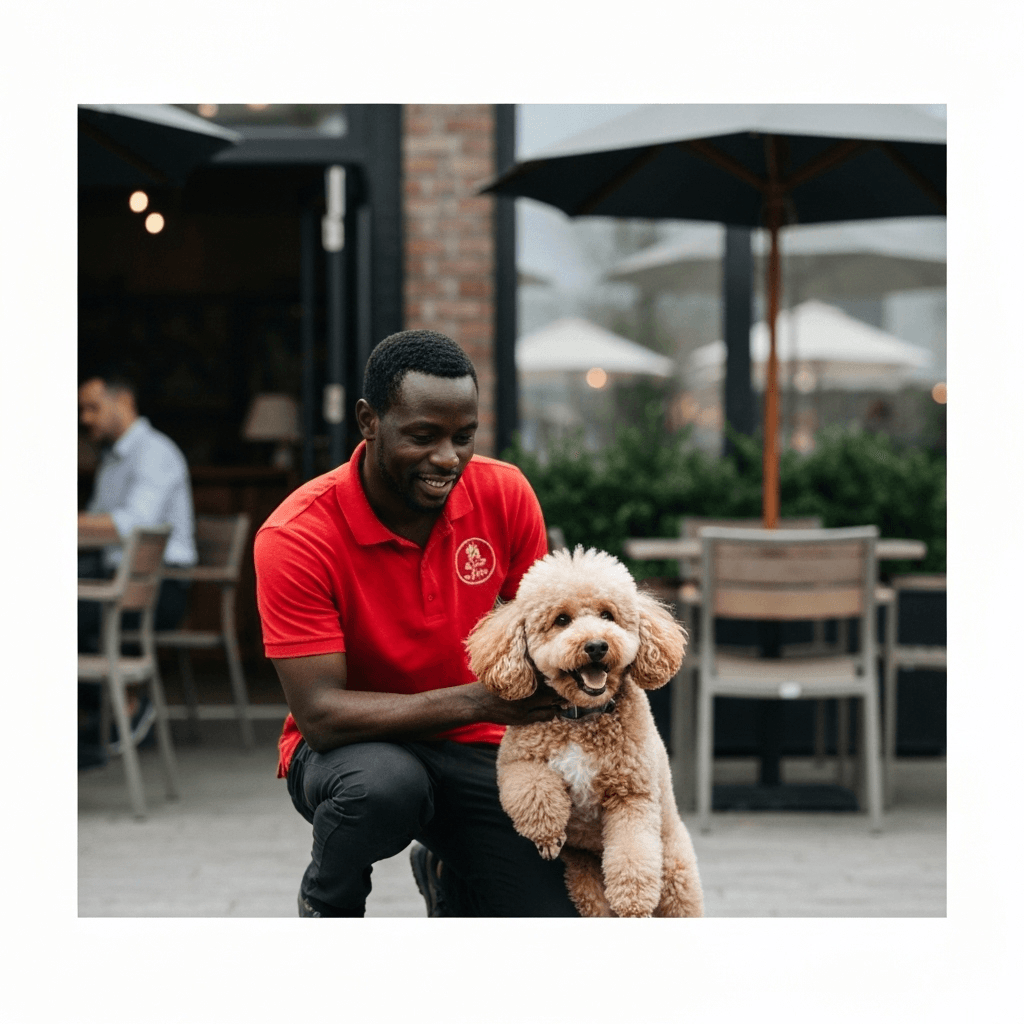
Common Questions About Dog Training
How much does in-home dog training cost?
Private in-home sessions in Silver Spring typically range from $140 to $225 per visit. Many trainers offer package deals that reduce the per-session cost when you commit to multiple lessons.
Is in-home dog training worth the extra cost?
For puppies learning house rules, newly adopted dogs adjusting to their environment, or dogs with behavioral issues that occur specifically at home, in-home training often produces faster results. The trainer can address your exact living situation, daily routines, and environmental triggers that might not come up in a group class setting.
Can a trainer help with house training my dog?
Yes, many trainers include house training as part of puppy programs or day training services. However, successful house training requires consistent scheduling and supervision from you between trainer visits to establish reliable habits.
What is the 3-3-3 rule for new dogs?
This guideline suggests that newly adopted dogs typically need about 3 days to decompress from the stress of transition, 3 weeks to learn their new routine, and 3 months to feel fully settled in their new home. Effective training plans account for this adjustment period rather than rushing into intensive sessions.
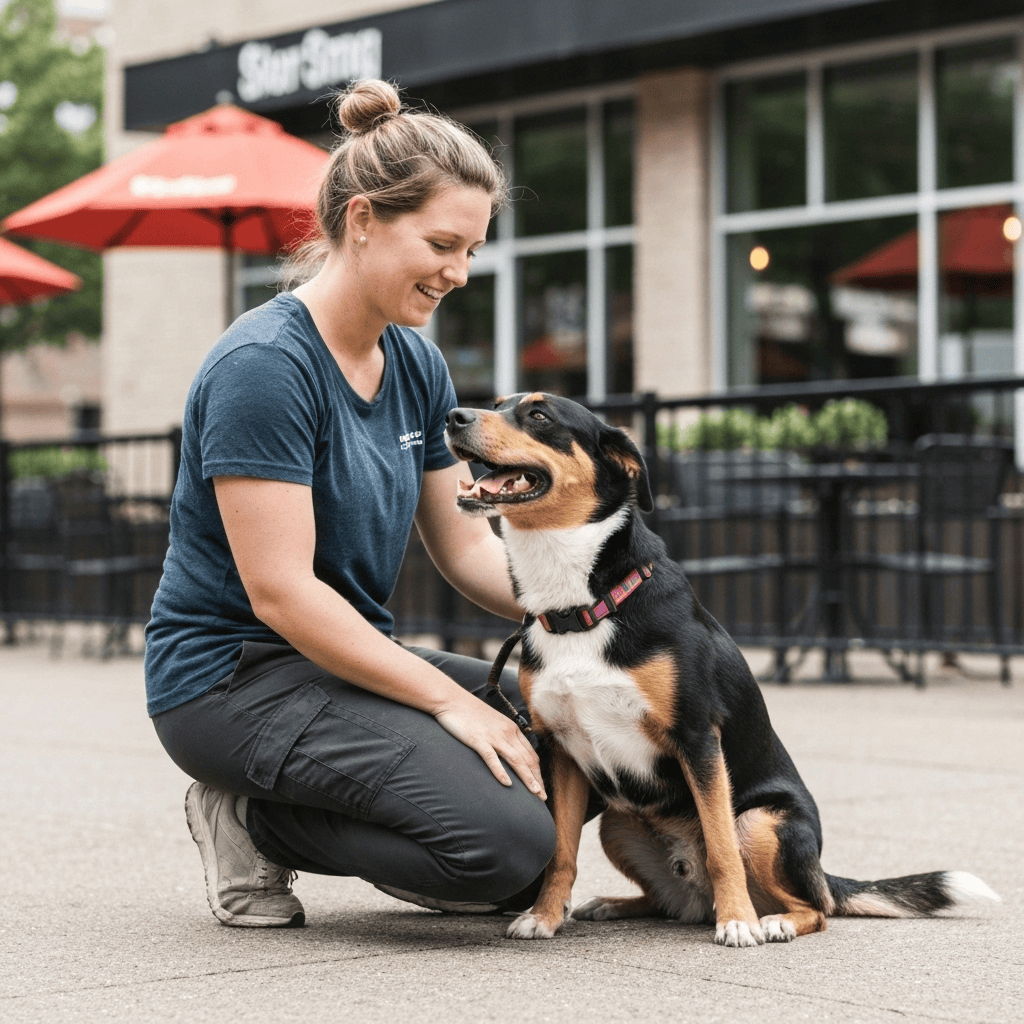
How long does dog training take to show results?
Basic obedience skills like sit, stay, and loose-leash walking often show improvement within 4 to 8 weeks of consistent practice. Behavioral issues such as reactivity, separation anxiety, or aggression typically require several months of gradual behavior modification work to see lasting changes.
What should I bring to group training classes?
Pack a flat collar or well-fitted harness, a standard 6-foot leash (avoid retractable leashes during training), small high-value treats, water for your dog, and any vaccination records your trainer requests. A positive attitude and patience with the learning process help too.
What are the leash laws in Silver Spring?
Silver Spring follows Montgomery County regulations requiring dogs to be leashed in all public areas except designated dog parks. This includes trails, regular parks, and neighborhood sidewalks. Violation of leash laws can result in fines and liability issues if problems occur.
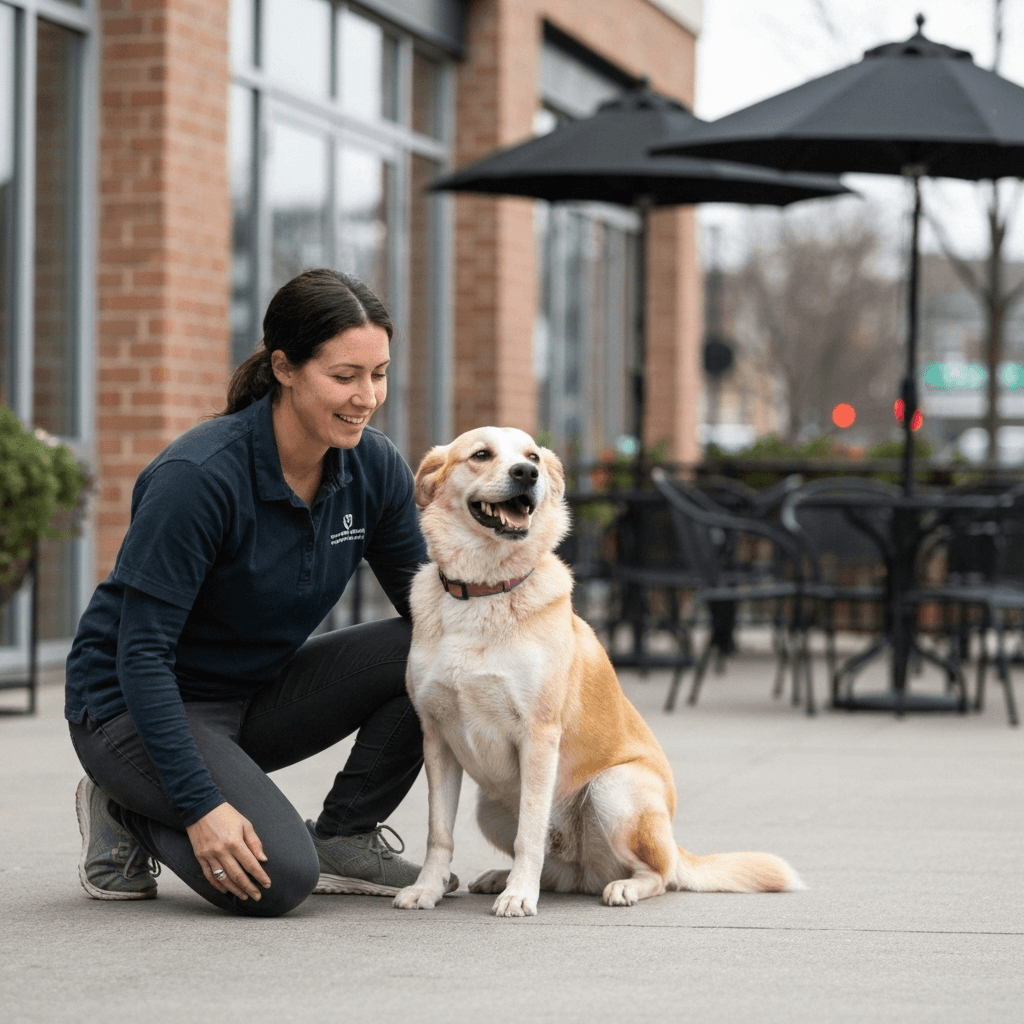
Do I need to license my dog in Montgomery County?
Yes, all dogs four months and older must be licensed through Montgomery County. You can find application information and requirements at Pet Licensing.
What vaccinations does my dog need in Maryland?
Maryland requires current rabies vaccination for all dogs. Your veterinarian may recommend additional vaccines like DHPP (distemper, hepatitis, parvovirus, parainfluenza) based on your dog’s lifestyle and risk factors.
Are dog trainers licensed in Maryland?
No special license is required for dog trainers in Maryland. Look for trainers with professional certifications like CPDT-KA or KPA-CTP, and ask about their insurance coverage, experience, and training methods.
Where can I practice off-leash recall training?
Use only designated fenced dog parks like Ellsworth Urban Dog Park or Takoma Park Dog Park for off-leash work. Practicing recall off-leash in other areas violates local leash laws and puts your dog at risk.
Can I train my dog at local parks?
Leashed training is welcome at most Montgomery County parks, including Sligo Creek and Rock Creek trail systems. Keep sessions brief and considerate of other park users, and always clean up after your dog. Check posted rules at each location, as some areas may have seasonal restrictions.
Do trainers need permits to teach classes in parks?
While Maryland doesn’t require trainer licensing, Montgomery Parks may require permits and proof of liability insurance for commercial group classes. Individual trainers should check requirements at Park Permits before scheduling public sessions.
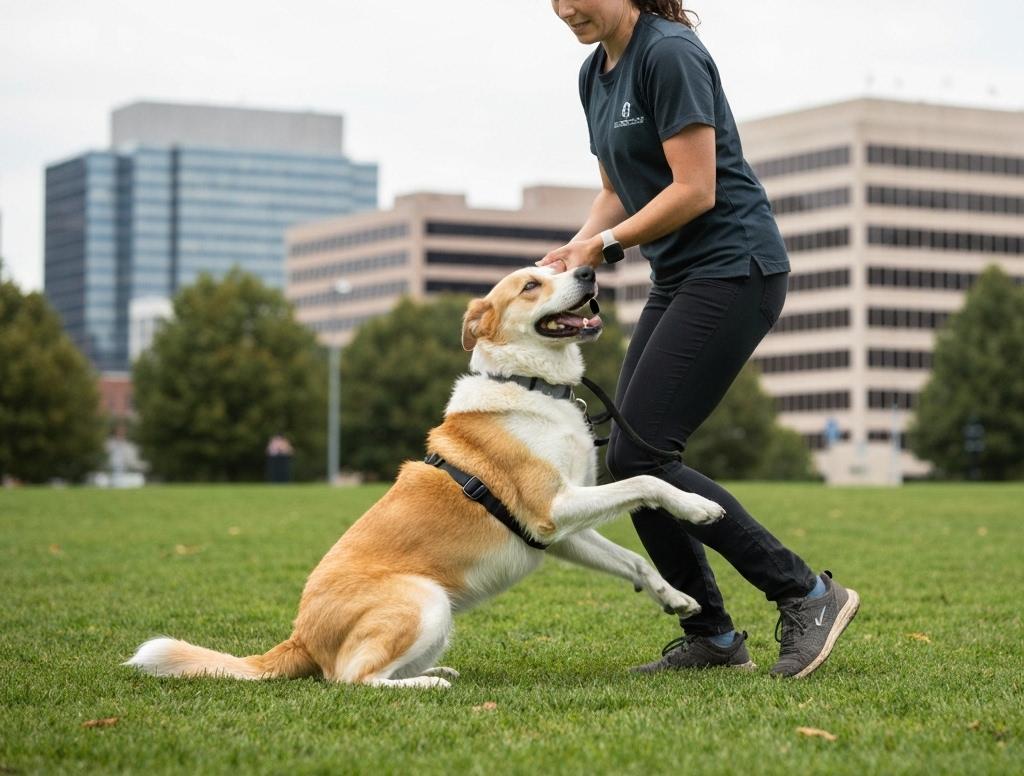
The right training program helps your dog become a confident, well-behaved companion who can handle Silver Spring’s unique challenges. Focus on positive methods, consistent practice, and gradual exposure to real-world situations. With patience and the right professional guidance, your dog will learn to navigate busy urban environments while remaining calm, focused, and enjoyable to live with.
